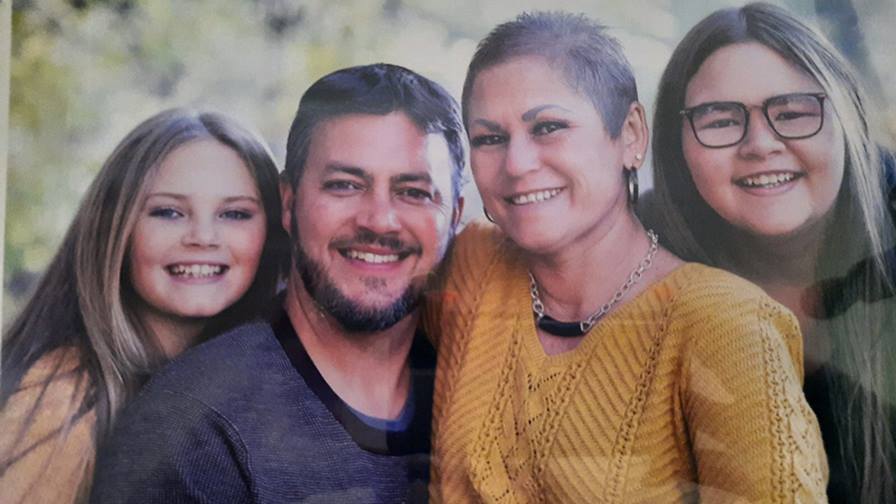
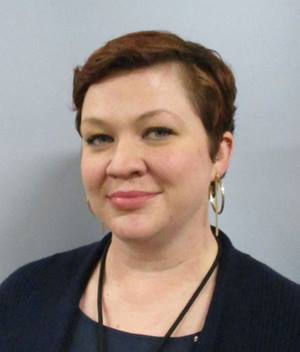
Bekah Jeffrey's, licensed social worker, took the two girls and their mother on a VIP tour.
Bobby Jo Dansie’s daughters Makaylee and Taelynn can still remember when their grandma went to the hospital and didn’t come home. So, when Bobby was diagnosed with breast cancer last year her daughters were very concerned.
Unfortunately, just when Bobby was due to get her first treatment at the Gossner Cancer Center, which is near Logan Regional Hospital, COVID-19 began changing everything. Because of COVID-19 she couldn’t have her daughters go in with her for her treatments.
Caregivers at the center who knew of Bobby’s situation came up with a plan. They waited until all the patients had gone home for the day, made sure everyone was masked up, and they gave Bobby and her daughters, who were 13 and 11-years old at the time, a VIP tour of the facility led by Bekah Jeffreys the center’s licensed social worker. Richard Johnson, DO, joined them at the end of the tour to answer questions from the family.
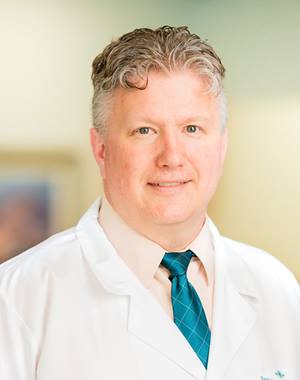
Richard Johnson, DO, answered questions that the girls asked of him about their mother's treatment.
“Dr. Johnson walked them through a lot of what was going on and they had a lot of questions and he was extremely good with the kids,” Bobby says. “I think a lot of him. He took the time to explain everything to my kids and answer their questions. He was really good and I’m surprised he doesn’t work with kids, honestly.”
“Probably the most touching moment was when Makaylee looked at me and said, ‘Is my mom going to die?’” Bekah says. “I told them, ‘Our goal is to do everything we can to cure this cancer and take care of her as best we can while she’s here with us.’”
“The fear that mom might not come back home was in the back of their minds,” says Bobby. “They worried mom might die at the hospital.”
Julie Bennett, RN, nurse navigator, says they hoped the tour would help the girls understand what her mother was going through and help them envision what the treatments would be like.
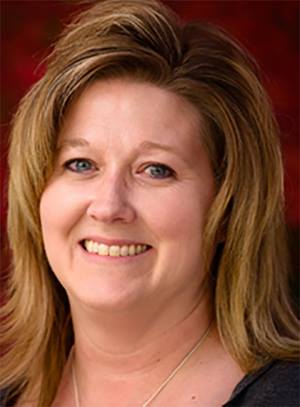
Julie Bennett, RN, nurse navigator, says they wanted the girls to see for themselves where their mom would be treated.
“We wanted them to see where she was going to get her treatments, see that she would sit in a nice chair where she can look out the windows, and have snacks and blankets,” she says, adding that it was also important they get a chance to meet some of the people who’d be helping their mother.
It’s the “unknowns” that cause anxiety to increase with family members so they try to answer as many questions as they can at the Gossner Cancer Center, Bekah says. Dr. Johnson agrees, saying people tend to naturally fear what they don’t understand.
“In our society and culture today, whether it's in the medical culture or in the community at large, cancer is a swear word,” Dr. Johnson says. “People think of it as a death sentence. When someone hears of somebody who has cancer, people often think that person will lose all their hair, get really sick, and then they are going to die. That's not generally the case. Even cancers that 10 years ago were considered incurable, are now being seen to be potentially curable.”
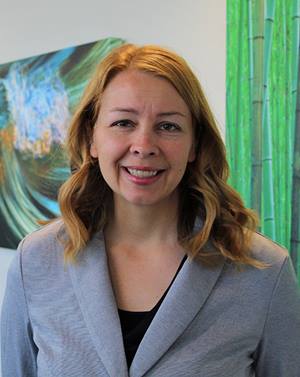
Suzanne Eliason, medical oncology manager, says caregivers who work at the center find it rewarding.
Bekah says that they tried to make the girls feel comfortable as they showed them around the center.
“When we took them on our little tour, we got the girls little bags with breast cancer shoelaces and playing cards that had the pink ribbon on it for breast cancer, and some little treats,” Bekah says. “And then we were able to show them back here where we do the infusion. One of our pharmacists was there and was able to pop her head out and say hi to the girls, so that they met her.”
Bobby says she “absolutely loves the nurses” that help her but is frustrated that “chemo fog” makes it hard for her to remember their names. She specifically mentioned Mandy Douglas, RN, Tessa Sunderland, RN, Casey Rowley, RN, and Lacey Smith, and Judy Kruitbosch, radiation therapists.
“You don’t want a crabby nurse who you don’t have a relationship with,” she says. “You’ve got to feel at home there and the nurses there are very good nurses.”
She says she also appreciates Sarunas Sliesoraitis, DO, Justin Peterson, MD, and the contributions of the Gossner family that led to the creation of the center.
When Bobby was diagnosed with cancer she had been out of work for two years because she had been injured and her husband’s work was slowing down because of COVID-19.
She says Julie and others at the center helped her figure out how to pay for her treatment and a non-profit, Cache Valley for Hope Cancer Foundation, assisted her family with non-medical bills.
“If it hadn’t been for them, I’d have been completely lost,” Bobby says.
Even with that help there were still a host of complexities she had to wrestle with at a time when she was dealing with what she called “chemo fog,” a side effect of the treatment that can make it hard to reason things out that would have been simpler before she got cancer.
“You just can’t figure things out,” she says. “You’re pretty much stuck in your own head trying to figure out the littlest things.”
Bobby says she wanted to share her story because she wants people to know they need to be open to asking for help and getting assistance.
“Your kids can be a part of your journey, and they don’t have to be scared when their parents leave,” she says. “I think it’s super important that you know your family can be involved. You’ve got to have your treatment be an open book, so your kids can understand and your family can understand what you’re going through and be able to help you. Without help from them, from the community, and Cache Valley for Hope, there’s no way I would have made it through this. I can’t tell you how blessed I am for everything they’ve all done for me and my family.”
Bobby says she appreciates the help and support her husband, Brandon, has given her during her journey.
“It’s so important to have goals and dreams that will help you mark the dates and move on to the next part of your journey," she says. "I would like to thank the troop I had beside me. I couldn't have done it without all of them. In this family we continue to grow and no one will ever have to fight alone.”
Bobby says she’s now recovering which doesn’t mean she’s still not suffering from her cancer aftermath. She has bone pain, and her feet and hands hurt from neuropathy. And she worries her mental capacity to comprehend things might never return like it was before her treatments began.
Dr. Johnson says that no one can guarantee how the body will respond to cancer treatments.
“We try and do our best to get everybody back to real life; we really want people to thrive in spite of cancer,” he says. “You can’t control what the cancer will decide or won’t decide to do, but we treat the whole person and the vast majority of our patients have good results. They don’t have to come back.”
Suzanne Eliason, medical oncology manager for the center, says she appreciates the people she works with.
“I would definitely say every caregiver who works at this facility has a desire to work with oncology patients, they feel a connection with them, and that makes their job more meaningful,” she says. “Because they make a difference in each patient’s life, even though it can be difficult at times, it’s a very, very rewarding profession. We hire physicians who really have a desire to work with this complex patient population, knowing what compassion and emotion it takes, understanding that it’s an incredibly exceptional role because you do become like family to each patient.”
Since the cancer center opened in 2019, it has helped out more than 800 community members with a new cancer diagnosis.

